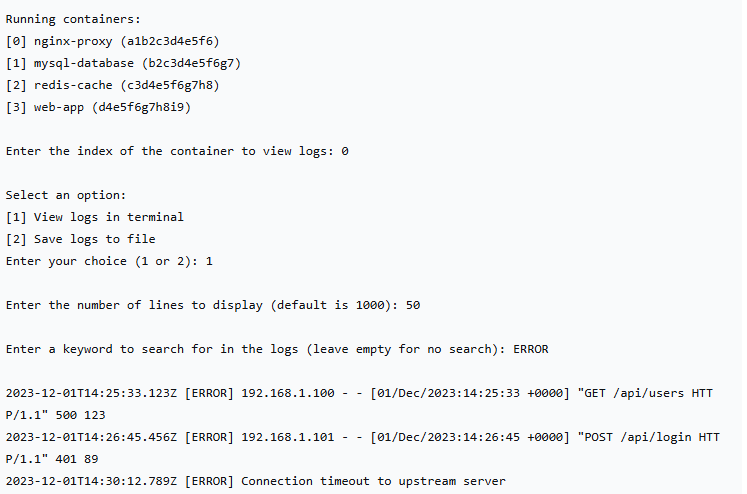bash
#!/bin/bash
# 获取docker ps输出,提取容器ID和名称,并存入数组
container_ids=($(docker ps -q))
container_names=($(docker ps --format '{{.Names}}'))
# 检查是否有运行中的容器
if [ ${#container_ids[@]} -eq 0 ]; then
echo "No running containers found."
exit 1
fi
# 显示容器列表供用户选择
echo "Running containers:"
for i in "${!container_ids[@]}"; do
echo "[$i] ${container_names[$i]} (${container_ids[$i]})"
done
# 请求用户选择容器
read -p "Enter the index of the container to view logs: " choice
# 验证用户输入是否为有效数字
re='^[0-9]+$'
if ! [[ $choice =~ $re ]]; then
echo "Error: Invalid input, please enter a number."
exit 1
fi
# 验证用户选择是否在范围内
if (( choice < 0 || choice >= ${#container_ids[@]} )); then
echo "Error: Index out of range."
exit 1
fi
# 获取用户选择的容器ID和名称
selected_container_id="${container_ids[$choice]}"
selected_container_name="${container_names[$choice]}"
# 功能选择菜单
echo ""
echo "Select an option:"
echo "[1] View logs in terminal"
echo "[2] Save logs to file"
read -p "Enter your choice (1 or 2): " option
case $option in
1)
# 查看日志功能
read -p "Enter the number of lines to display (default is 1000): " lines
lines=${lines:-1000}
read -p "Enter a keyword to search for in the logs (leave empty for no search): " keyword
if [ -z "$keyword" ]; then
docker logs -f --tail "$lines" "$selected_container_id"
else
docker logs -f --tail "$lines" "$selected_container_id" | grep "$keyword"
fi
;;
2)
# 保存日志功能
echo ""
echo "Save log options:"
echo "[1] Last 2 days (default)"
echo "[2] Last 24 hours"
echo "[3] Last 7 days"
echo "[4] Custom hours"
echo "[5] All logs (since container start)"
read -p "Enter your choice (1-5): " time_option
case $time_option in
1|"")
# 最近2天 = 48小时
since_time="48h"
since_display="2 days (48 hours)"
;;
2)
since_time="24h"
since_display="24 hours"
;;
3)
since_time="168h"
since_display="7 days (168 hours)"
;;
4)
read -p "Enter number of hours: " custom_hours
since_time="${custom_hours}h"
since_display="${custom_hours} hours"
;;
5)
since_time=""
since_display="all logs (since container start)"
;;
*)
echo "Invalid option, using default (2 days)"
since_time="48h"
since_display="2 days (48 hours)"
;;
esac
# 生成文件名
timestamp=$(date +"%Y%m%d_%H%M%S")
filename="${selected_container_name}_logs_${timestamp}.log"
echo "Saving logs for container: $selected_container_name"
echo "Time range: $since_display"
echo "File: $filename"
echo ""
# 保存日志(根据是否指定时间范围使用不同的命令)
if [ -z "$since_time" ]; then
docker logs "$selected_container_id" > "$filename"
else
docker logs --since "$since_time" "$selected_container_id" > "$filename"
fi
if [ $? -eq 0 ]; then
echo "Logs successfully saved to: $filename"
echo "File size: $(du -h "$filename" | cut -f1)"
echo "Lines saved: $(wc -l < "$filename")"
else
echo "Error: Failed to save logs"
# 清理可能创建的空文件
if [ -f "$filename" ] && [ ! -s "$filename" ]; then
rm "$filename"
fi
exit 1
fi
;;
*)
echo "Invalid option selected"
exit 1
;;
esac正确的时间格式:Docker logs 的 --since 参数支持以下格式:
10m - 10分钟
2h - 2小时
30h - 30小时
2007-01-02T15:04:05 - 具体时间戳
提供多个预设选项:
2天 = 48小时
24小时
7天 = 168小时
自定义小时数
所有日志
更好的错误处理:如果保存失败,会清理空文件
Docker logs --since 支持的格式:
10m - 10分钟前到现在
1h30m - 1小时30分钟前到现在
2h - 2小时前到现在
2013-01-02T13:23:37 - 从特定时间点开始
现在脚本应该能正常工作,不会出现时间格式错误了!
